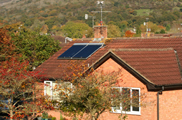 The benefits of solar energy, harvested both on a mass scale and domestically through the installation of solar panels on rooftops, have been widely lauded by environmentalists, power companies and the UK Government. In pursuit of zero carbon homes, solar energy is regarded as one of the principal agents of change in home central heating.
The benefits of solar energy, harvested both on a mass scale and domestically through the installation of solar panels on rooftops, have been widely lauded by environmentalists, power companies and the UK Government. In pursuit of zero carbon homes, solar energy is regarded as one of the principal agents of change in home central heating.
Whereas wind power is generally unsuitable for domestic use, solar energy is relatively easy to install and provides power throughout the year. However, unlike the wind power industry, commercial solar energy is proving more financially vulnerable in the current economic climate.
Indeed, despite Germany’s recent economic recovery, its primary provider – and the world’s second largest manufacturer – of solar panels has recorded operating losses of around £41 million. Q-Cells has reported that sales for the first half of 2009 are down more than 36% on the previous year. This represents losses in excess of £315 million, although the company’s overall deficit is almost double this figure following negative share related activities. One consequence of Q-Cells’ downturn is that the firm is reducing its workforce by some 500 employees.
Unfortunately, Q-Cells’ poor business results are indicative of a trend emerging among solar cell manufacturers. ReneSola and JA Solar have also reported heavy losses. Specifically, following publication of their second-quarter reports, ReneSola is just over $3.5 million in the red whilst JA Solar has losses of $28.5 million. Therefore, the question must be asked: is solar power on a commercial scale financially viable? If Q-Cells, ReneSola and JA Solar are anything to go by, the answer is one that environmentally conscious home energy consumers may not want to hear.


